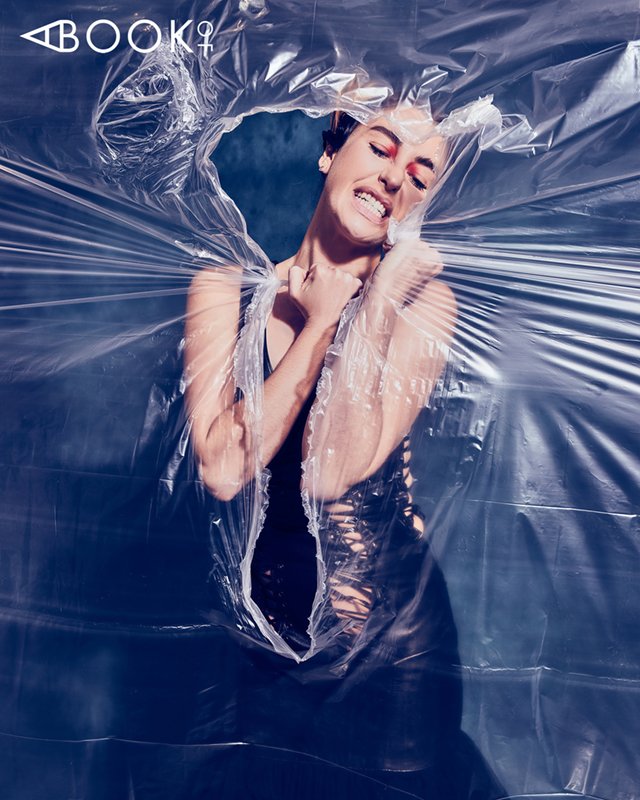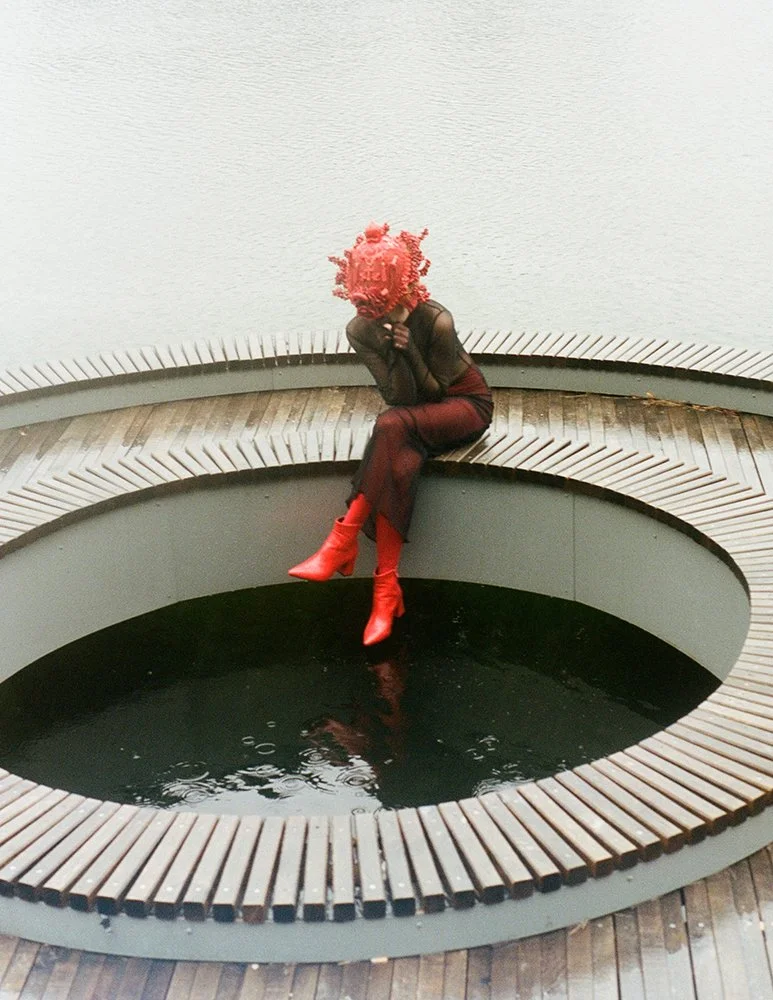KIMBRA: THE RECKONING [IN PRINT]
INTERVIEW BY LOUISE BARRETTO
PHOTOGRAPHER: IRVIN IRVERA, FASHION STYLIST: ALEXIS BERGENS, MAKEUP ARTIST: CHRISTOPHER MILES, HAIR STYLIST: PHILIP NATHANIEL, PHOTO ASSISTANT: JESSE ZAPATERO, PRODUCER: LOUISE BARRETTO, GRAPHICS DESIGNER: PHIL LIMPRASERTWONG
Dress: VAISHALI S
EDITOR’S NOTE: Imagine yourself walking naked, barefoot on a busy street devoid of fear, judgment and expectations, completely tuned out from the voices telling you what others may think of you and giving zero fucks - that’s vulnerability. In our current world where facades, projections and putting your best foot forward are hyped up, vulnerability seems rare.
Vulnerability is such a powerful word. It requires you courage and strength to do the act itself. It’s not easy to expose yourself, and fully open yourself especially when you’re an artist that creates and shares things that you made from your core to your universe. Being vulnerable is easier said than done, but when accomplished, the rewards are fruitful. Being vulnerable grounds you in a freeing way. Once you realize that you can create with no bounds, no fear, no judgment, you’re liberating yourself from anything that is holding you back. And as an artist, it’s an important trait to be vulnerable. I feel like you’re most creative when you’re most vulnerable. You’re more aligned with yourself and you create.
Dress: ANNAKIKI, Boots: NO NAME
In this Collector's Print Issue, we’re highlighting Kimbra, a multi hyphenate artist that shines through her vulnerability in her creations. The Grammy Award winning artist has been creating openly through the years and she constantly reminds us of the value of artists in the world - artists who bare their souls and open up the different layers of themselves to vulnerability to create, share and interact with the world that sees them.
It’s like playing with fire. Once you go through all the motions that will lead you to your most open, vulnerable state, you will soon realize how you’ll emerge victorious like a phoenix from the ashes. It’s that transcendental experience in art - to exist beyond the normal and physical levels. You see the underlying threads that connect a lot of seemingly unrelated things together - rage and passion, joy and despair, triumph and loss.
Your art becomes more meaningful, more sincere,more relatable as it is deeply rooted in your core. And the audience sees that. The moment the audience feels what you’re creating, there’s shared vulnerability. You’ll be surprised to learn that when you open up, people around you open up as well and there is a presence of a more free-flowing positive energy of creation. As Kimbra brilliantly puts it, as an artist, you’re a vessel of creation:
“Something in my soul is sort of still saying I’m going to turn up to this and trust that even if I’m not all there, something will move through me that will communicate something that doesn’t even need me. That’s the humility of the spirit. You’re just a vehicle, baby.”
IRVIN RIVERA, EDITOR-IN-CHIEF
Kimbra has been on my radar since she exploded into the music scene with SOMEBODY THAT I USED TO KNOW, her Grammy award-winning collaboration with Gotye. Then in 2013, I flew to Singapore from Manila to watch her live at Laneway Music Festival. After moving to Los Angeles, l had to pop my Coachella cherry and again got to watch her perform at the Gobi stage, but now, as an Angeleno. Almost a decade later, I’m producing a photo shoot with her for A BOOK OF and interviewing her. I’ve known Kimbra from afar and it’s refreshing to get to know her more as an artist and as a human – even if only for an hour. It’s almost as if I wasn’t talking to this multi hyphenate musical genius, but rather to a high priestess of sorts who pursues spiritual enlightenment and sprinkles tidbits of divine wisdom as soon as inspiration strikes.
Kimbra captures lightning in a bottle, but that’s because she’s in service to the creative spark. “Often, it’s triggered by an interesting beat, or a progression on piano that makes me feel something. And then once the melody pops in, it’s like, alright time to listen. I’m in service of whatever’s wanting to come through. And you’re following a spark, you’re just following it and desperately trying to not get in your own way.”
Dress: ANNAKIKI, Boots: NO NAME
Kimbra’s journey to A RECKONING is informed by her three previous LPs and for her, every album cycle is always a reaction to the last one. “VOWS being the first album, is this amalgamation of all my childhood experiments with little loop pedals, eight tracks from the age of 16, kind of a lot of joke songs that I didn’t think could go anywhere, and then developed into fully fleshed out ideas. THE GOLDEN ECHO is like my teenage years. I’m going to experiment with maximalism, density. I’m going to get my favorite high school bands to play on the record like from Queens of the Stone Age to Muse to the Mars Volta. Then of course, PRIMAL HEART becomes a record about me trying to uncover something essential, like coming back to these primal origins of what is most essential to the human condition. You’ve got songs like HUMAN and TOP OF THE WORLD, which is so much of my ego and I think of it as a slightly more tame record than THE GOLDEN ECHO but was still very much a big part of me discovering, continuing to find my voice. Then A RECKONING is an exploration of rage and anger and vitality and protest. Every album has its theme and they are like time capsules.”
Dress: VIVIAN MOAWAD, Earring: MAHRUKH AKULY
A RECKONING was made with no help from a record label. Having that much musical freedom has its own challenges despite all of Kimbra’s accomplishments. She still struggles with self-doubt and grew used to the reassurance and validation from people she admired at record labels, but now she’s learned to trust her own gut and trust her collaborators. The new record is produced by Ryan Lott from Son Lux, the Oscar-nominated experimental band that composed the score for A24’s EVERYTHING EVERYWHERE ALL AT ONCE. Kimbra mentions that she is doing this Zoom call at her friend Liz’s house, who goes by Brux, an electronic DJ and producer who co-produced REPLAY with her and is the 2nd single off the new record. “When I find my people, I lock them in. Ryan Lott, I met on tour. It’s kind of that thing of trusting the spirit to just lead you.”
Dress: MARTA MILJANIC
Dress: VAISHALI S
If Kimbra were a book, she would be the Pulitzer Prize winning novel THE OVERSTORY by Richard Powers. “It’s really just a meditation on trees, but from all these different walks of life, people living at different times and they basically do a deep dive. It’s rooted in real life but the theory is, the trees are the heartbeat of our whole world and as they die, we will die. They’re trying to save the trees and various things are happening and different love stories that are going on and different families that are interacting with these trees. At the core of who I am, I am a forest girl. I grew up in New Zealand with volcanoes around me and lakes. That’s how I first learned to write music – sitting on the edge of my father’s boat driving across a lake. It looks like glass – the volcano in the distance, New Zealand forest everywhere. And honestly, I’ve always felt very close to trees. And that’s sort of my calm, contemplative side, like I have this crazy side. I feel like if I was a book, I think it would have to explore imagination and inner worlds, and maybe nature. So that’s a very beautiful poetic book about our relationship with our natural world.”
Jacket: CHARLES & RON
















